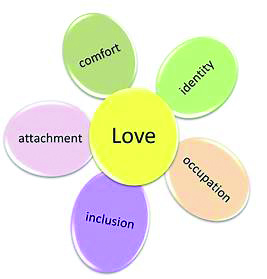
By C.Angela BurrowWe often hear the phrase person-centered care related to frail people and our role to support unmet needs.We should not make any presumptions about the meaning of person-centered care, as it depends on who we are supporting.
A good place to start is to study Thomas Kitwood and his Flower of Needs.Kitwoods model of person-centered care guides us with key principles:Attend to the whole personEach person is uniqueGive respect to their pastFocus on positives and strengthsNourish attachmentsMaximize freedom and minimize controlDont just givereceive as wellFLORAS STORYFlora, who was diagnosed with dementia, was a new resident in a memory care community.On the surface, she seemed to be content, with less cognitive decline than some of her neighbors.Her physical abilities afforded her more independence.
She was able to enjoy her meals after finding her way to the dining room unaided.She needed help with taking her medications and at her shower time.She did not socialize with other residents in their living room or in the community-organized activities.
She liked to walk through the hallway, often stopping to straighten a floral decoration or other dcor.As she seemed content, she was left alone much of the time.Slowly, through the days and weeks, Flora started to take ownership.She would gather wet paper towels and wipe down the tables and countertops in the craft room.
She found some Swiffer dusters, and at the end of the day, after dinner, she would dust and straighten chairs in the common areas.This story is important, as not everyone is as confident or able as she was at her stage of dementia.Could the family and staff have done better enabling her in the first few days after she moved in? Not enough questions were asked related to What was important to Flora? and How may we best support her?She had been a homemaker all her adult life, and if she had been encouraged to help more in the community, her transition from her home of decades could haveand should havegone more comfortably for her.DORIS STORYMy moms most cherished loves in her life were her family and her faith.As a little girl at the age of 10, she began playing the organ and piano in her church for Sunday services.
This continued for the rest of her life until she retired.I mention this because my mom played all of her music by ear, or she memorized it.She could read music, but her piano teacher taught her to memorize all her pieces because she may be asked to play somewhere and not have her music with her.This gift would become a valuable treasure during her journey with dementia.Many great memories were made and shared during those days.
One memory that was shared with me was a time when the activity director was reading a Bible story about David the future King to a small group of residents in memory care.My mom walked by and stopped to listen.As the story was finishing, Mom turned and whispered something to one of the caregivers.
That caregiver then helped her over to the piano, and she began to play hymns for the group to sing together.When I was told about this, it brought me so much joy and comfort in knowing that at that moment, my mom was inspired to share her faith in the way that she knew how, and that she felt a part of this group.Those activities that seem so small at the time have a profound meaning to many people living with dementia.Story told by Leslie S., daughter of DorisJoin us for the monthly Carepoint Caregiving Caf3rd Tuesday of each month at 10 a.m.for an hour of resources and conversations on aging and caregiving.RSVP TEL: 980-226-5516
Disclaimer: This story is auto-aggregated by a computer program and has not been created or edited by Senior Savings Deals.
Publisher: Life Plan Community ( Read More )
Publisher: Life Plan Community ( Read More )

